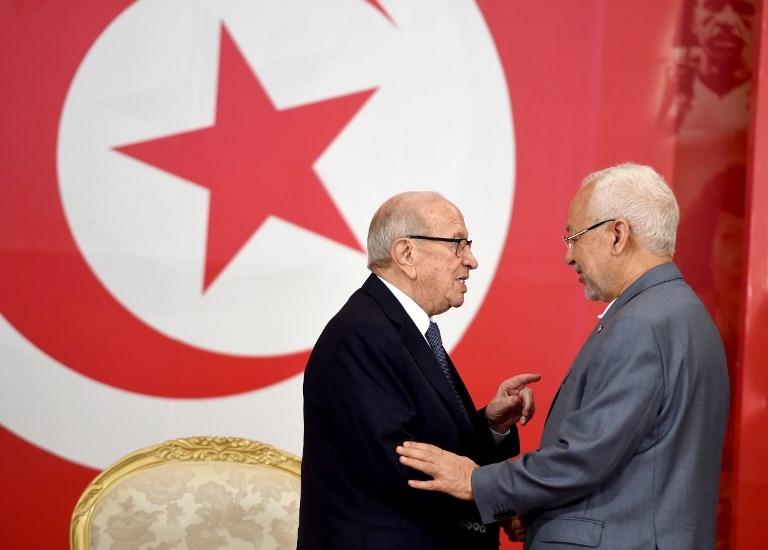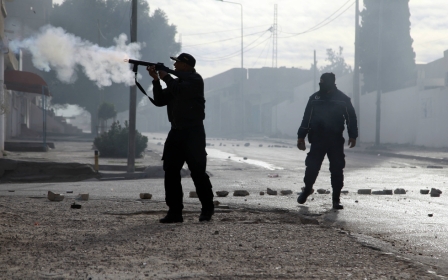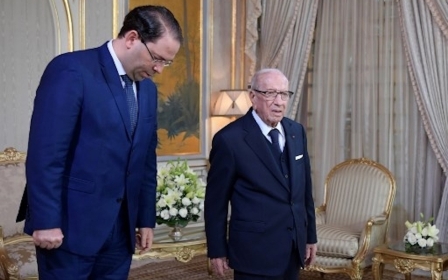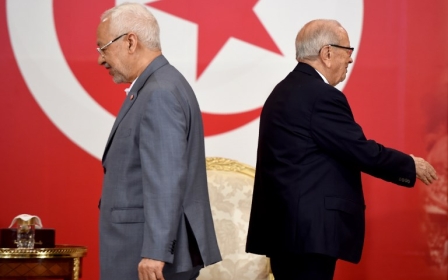Tunisian rivals Essebsi and Ghannouchi hold talks despite recent fallout

Tunisian President Beji Caid Essebsi has held private talks with the leader of the Ennahda party, Rached Ghannouchi, as the political rivals look to defuse a crisis that reached its peak last summer when the president announced the end of his alliance with Ennahda.
According to a Tunisian source with knowledge of the talks, the two leaders met privately on Tuesday at the Carthage presidential palace to discuss the North African country’s political and social crisis ahead of the eighth anniversary of the toppling of former president Zine El Abidine Ben Ali.
According to the source, who spoke on condition of anonymity due to the sensitivity of the subject, the meeting was a result of Qatari mediation efforts kickstarted last month by the emir of Qatar, Sheikh Tamim bin Hamad al-Thani.
Ghannouchi and Essebsi’s son Hafedh Caid Esebsi, who is the head of Nidaa Tounes, the political party founded by his father, held a meeting in Doha attended by the emir, aimed at defusing the political crisis between the two largest parties in Tunisia.
Tuesday’s meeting signalled that the two sides “did not break up” and that they remain in contact despite disagreements, the source said.
Essebsi, who hails from the secular nationalist party Nidaa Tounes, announced an end to his consensus with Ennahda last summer, citing their continuous backing of incumbent Prime Minister Youssef Chahed. Chahed is a former member of Nidaa Tounes but was suspended after falling out with the Essebsis. He visited Saudi Arabia in December.
In response to the ending of the agreement between the two parties, Ennahda insisted it was still committed to “the path of consensus” among parties from across the political spectrum, emphasising the importance of holding elections scheduled for the end of 2019.
The purpose of the talks, according to the source, is to maintain “the minimum threshold of relationship” between the two pillars of political consensus in Tunisia - in place since 2014.
Ennahda, now the largest political party after Nidaa Tounes lost its majority, has been under attack from President Essebsi and his allies over its alleged links to two high-profile political assassinations in 2013.
Essebsi has publicly lent his support to lawyers of the two assassinated leftist leaders, Chokri Belaid and Mohamed Brahmi, who launched lawsuits accusing Ennahda of creating a “black room” within the interior ministry in 2013 to destroy evidence of its alleged involvement in both murders.
Ennahda denied the accusations, and criticised Essebsi’s backing of the lawsuits as “a dangerous precedent that contradicts the neutrality of an official institution”.
'Political manoeuvering'
Despite warnings of a possible coup against Ennahda and its allies, analysts have downplayed the current crisis as merely “political manoeuvring” by Nidaa Tounes ahead of the 2019 elections.
Anthony Dworkin, a senior policy fellow at the European Council on Foreign Relations, told Middle East Eye following a recent visit to Tunisia that the situation “seemed less serious and threatening” than 2013, which witnessed comparatively high levels of violence, assassinations and street protests.
He said the recent anti-Ennahda stance by the president has been “a narrow political manoeuvre rather than a fundamental split within political society”.
Similarly, Sharan Grewal, a postdoctoral research fellow in the Centre for Middle East Policy at Brookings, said Essebsi’s promotion of cases against Ennahda was partly out of revenge for the latter’s support for Chahed, but also “an important electoral tactic”.
“Amplifying this case is a way for Nidaa Tounes to repolarise Tunisians into Ennahda and anti-Ennahda camps, and for it to reclaim its mantle of the anti-Ennahda forces ahead of the 2019 elections,” he told MEE.
The renewed talks, however, raise questions over whether Ennahda could change its position towards Chahed.
Chahed’s suspension cost Nidaa Tounes its parliamentary majority, as nearly half its MPs defected to join the National Alliance, a new bloc formed by Chahed and expected to establish a political party in the coming weeks.
Ennahda has yet to change its position on Chahed’s government, according to the source, while Essebsi still insists on ousting Chahed, citing his economic incompetence.
Chahed has been head of government since his appointment by Essebsi in August 2016, which was partly a result of a consensus between Ennahda and Nidaa Tounes to spearhead an economic reform programme aimed at meeting the demands of the International Monetary Fund (IMF).
Chahed’s implementation of the IMF deal over the past two years has required a set of tough austerity measures and structural reforms such as cutting fuel subsidies, reducing the public sector wage bill, and increasing taxes.
The reforms have been mainly opposed by the powerful workers union UGTT, whose 670,000 members constitute nearly 5 percent of Tunisia’s population and were hard hit by the reforms.
A general strike is planned for 17 January, days after the eighth anniversary of toppling Ben Ali.
New MEE newsletter: Jerusalem Dispatch
Sign up to get the latest insights and analysis on Israel-Palestine, alongside Turkey Unpacked and other MEE newsletters
Middle East Eye delivers independent and unrivalled coverage and analysis of the Middle East, North Africa and beyond. To learn more about republishing this content and the associated fees, please fill out this form. More about MEE can be found here.




